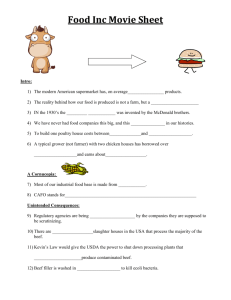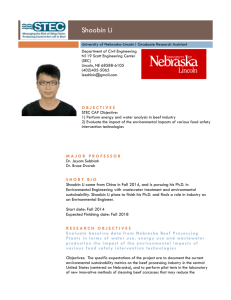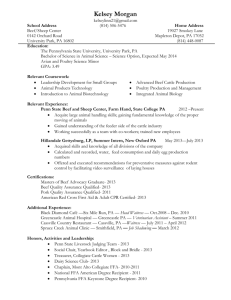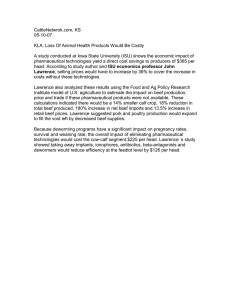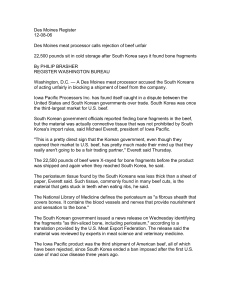Arkansas Democrat Gazette, AR 08-25-07
advertisement
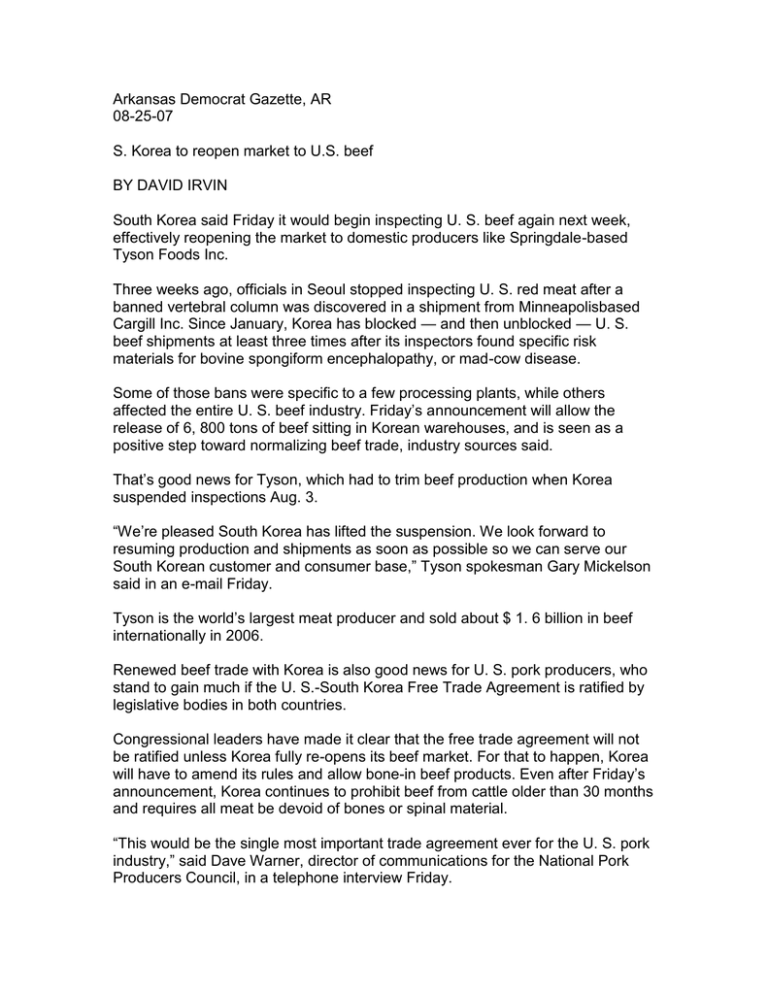
Arkansas Democrat Gazette, AR 08-25-07 S. Korea to reopen market to U.S. beef BY DAVID IRVIN South Korea said Friday it would begin inspecting U. S. beef again next week, effectively reopening the market to domestic producers like Springdale-based Tyson Foods Inc. Three weeks ago, officials in Seoul stopped inspecting U. S. red meat after a banned vertebral column was discovered in a shipment from Minneapolisbased Cargill Inc. Since January, Korea has blocked — and then unblocked — U. S. beef shipments at least three times after its inspectors found specific risk materials for bovine spongiform encephalopathy, or mad-cow disease. Some of those bans were specific to a few processing plants, while others affected the entire U. S. beef industry. Friday’s announcement will allow the release of 6, 800 tons of beef sitting in Korean warehouses, and is seen as a positive step toward normalizing beef trade, industry sources said. That’s good news for Tyson, which had to trim beef production when Korea suspended inspections Aug. 3. “We’re pleased South Korea has lifted the suspension. We look forward to resuming production and shipments as soon as possible so we can serve our South Korean customer and consumer base,” Tyson spokesman Gary Mickelson said in an e-mail Friday. Tyson is the world’s largest meat producer and sold about $ 1. 6 billion in beef internationally in 2006. Renewed beef trade with Korea is also good news for U. S. pork producers, who stand to gain much if the U. S.-South Korea Free Trade Agreement is ratified by legislative bodies in both countries. Congressional leaders have made it clear that the free trade agreement will not be ratified unless Korea fully re-opens its beef market. For that to happen, Korea will have to amend its rules and allow bone-in beef products. Even after Friday’s announcement, Korea continues to prohibit beef from cattle older than 30 months and requires all meat be devoid of bones or spinal material. “This would be the single most important trade agreement ever for the U. S. pork industry,” said Dave Warner, director of communications for the National Pork Producers Council, in a telephone interview Friday. Pork exports will increase to 600, 000 metric tons annually — twice the amount Japan buys currently — once the trade agreement is fully implemented, said Dermot Hayes, an economist and researcher at the Center for Agriculture and Rural Development at Iowa State University in Ames, Iowa. Beef shipments will increase to 154, 000 tons annually, Hayes will report in a forthcoming paper. However, it is now unclear when Korea would amend its strict import regulations on U. S. beef. The U. S. Department of Agriculture has asked the Korean government to adhere to the World Organization of Animal Health’s assessment that U. S. beef is a “controlled risk” for mad-cow disease. Originally, officials in Seoul said they would conclude amending their trade rules by September. However, Korean officials said they stopped work on the import rules after inspections ceased earlier this month. “We’ll have a good idea in the next couple of weeks on how this is going to move,” USDA spokesman Keith Williams said in a telephone interview Friday. Williams emphasized that Korea has yet to make the decision to allow bone-in beef, but he expects the new rules to be published after a public comment period ending around mid-October. South Korea and about 60 other countries blocked U. S. beef in December 2003 after mad-cow disease was discovered in a Washington-state cow. Before that, Korea was the third-largest U. S. beef buyer. Korea resumed inspections of U. S. beef in 2006, but a series of trade flaps have agitated the process of limiting trade restrictions. This all occurred as intense negotiations took place between the U. S. Trade Representative and officials in Seoul over a massive free-trade agreement that would benefit many U. S. industries. Lynn Heinz, vice president of information services at the Colorado-based U. S. Meat Export Federation, said any future errant shipments of banned products would likely cause another stoppage in meat inspections. “Are they pushing it ? Yeah, they probably are; but the bottom line is that is what our government agreed to, and that is what we are trying to live up to,” Heinz said Friday. South Korea’s ban of U. S. beef earlier this month led to a precipitous drop in cattle futures prices on the Chicago Mercantile Exchange. Analysts at the exchange said Thursday that live-cattle and feeder-cattle futures have turned bullish, and they continued to increase in value in Friday trading. Cattle contracts for October increased 97. 5 cents per pound. Shares of Tyson Foods rose 26 cents or 1. 2 percent to close at $ 21. 86 in Friday trading on the New York Stock Exchange. To contact this reporter: dirvin@arkansasonline. com


